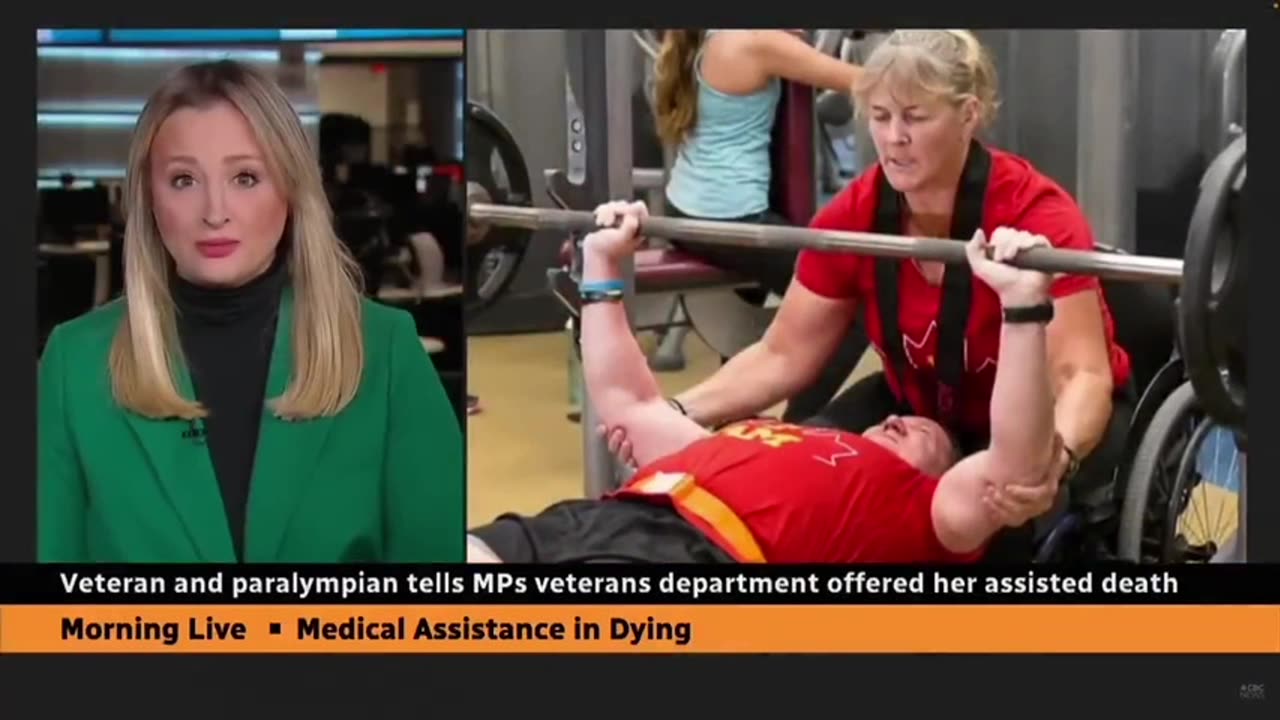Premium Only Content

Choice: The Controversy Surrounding Medically Assisted Death for Veterans in Canada
Introduction
Canada’s ongoing conversation about Medical Assistance in Dying (MAID) has taken a controversial turn with startling revelations from a retired veteran. In an emotionally charged testimony to Members of Parliament, retired Corporal and Paralympian Christine Gauthier revealed that Veterans Affairs Canada (VAC) offered her medical assistance in dying as a solution to her challenges—offering to provide the equipment necessary to facilitate the process. This revelation has sparked a national debate over the ethics, priorities, and responsibilities of government programs designed to support veterans.
The Incident
Christine Gauthier, who is paraplegic and has been navigating significant bureaucratic hurdles to get a wheelchair ramp installed in her home for over five years, described receiving an unsolicited offer for MAID in writing from VAC. The department’s suggestion, instead of providing the ramp, was to help arrange her medically assisted death. Gauthier’s testimony sent shockwaves through Parliament, highlighting a stark contrast between the expectations of support for disabled veterans and the actual assistance being offered.
Her case is not isolated. This incident follows similar reports where veterans claimed to have been offered MAID by VAC employees. These revelations raise critical questions about systemic failings in the department’s approach to addressing the needs of vulnerable individuals.
A Crisis of Priorities
Gauthier’s testimony underscores a deeper problem within VAC: the apparent inability to prioritize veterans’ basic needs. A wheelchair ramp is a tangible and practical requirement for accessibility—a symbol of independence and dignity. The five-year delay in fulfilling this request highlights bureaucratic inefficiencies and suggests a lack of urgency in addressing veterans’ quality of life. The offer of MAID, juxtaposed against this context, appears shockingly inappropriate, reducing a veteran’s life to a bureaucratic equation where death is seen as a solution to logistical challenges.
This approach reflects a troubling trend: rather than addressing the root causes of a veteran’s struggles, some systems seem to prioritize expediency over compassion. Offering medically assisted death in such scenarios risks normalizing a narrative where vulnerable individuals feel burdensome for seeking necessary support.
The Ethical Dilemma of MAID
Canada’s MAID program, initially designed for terminally ill patients seeking an end to unbearable suffering, has expanded significantly since its introduction. Recent legal changes have broadened eligibility to include individuals with chronic physical and mental health conditions. While the program provides relief for those who genuinely need it, the lack of safeguards in specific situations has raised concerns.
Ethical Questions Raised:
1. Coercion vs. Autonomy:
By offering MAID unsolicited, the system risks coercion, where individuals may feel pressured to choose death over being seen as a burden. Is true autonomy possible in such a context?
2. Access to Resources:
How can the government justify offering MAID while failing to provide essential support like accessible housing and healthcare? The implication is that death is easier to arrange than life-saving solutions.
3. Devaluing Life:
Offering MAID as a response to logistical challenges or mental health crises may inadvertently devalue the lives of vulnerable populations, including veterans.
The Political and Social Fallout
Gauthier’s testimony has ignited outrage across the political spectrum. Members of Parliament have called for immediate investigations into VAC’s practices and renewed scrutiny of Canada’s MAID program. Critics argue that the incident reflects a broader societal failure to adequately care for those who have served their country.
The case has also sparked public debate about how MAID is applied in practice. Advocates for stricter guidelines believe that such incidents highlight a dangerous lack of oversight, while others argue that offering MAID inappropriately undermines the program’s intended purpose.
A Call for Change
The outcry over Gauthier’s experience points to the urgent need for reform in how veterans’ services are managed and delivered:
1. Streamlined Support Systems:
Veterans require timely access to essential resources like housing modifications, healthcare, and mental health services. Bureaucratic delays must be minimized to ensure quality of life.
2. Ethical Oversight of MAID:
Stricter guidelines and oversight are necessary to ensure that MAID is offered appropriately and never as a substitute for addressing a person’s basic needs.
3. Cultural Shift in Veterans’ Affairs:
VAC must reevaluate its approach to supporting veterans, emphasizing dignity, compassion, and empowerment. Offering death as a solution betrays the trust of those who served their country.
Conclusion
Christine Gauthier’s testimony serves as a wake-up call to Canada about the state of its veterans’ services and the ethical complexities of MAID. It forces us to ask difficult questions about how we value life and what we owe to those who have sacrificed for their nation. Addressing this controversy requires more than apologies or surface-level reforms—it demands a deep commitment to reshaping systems to prioritize life, dignity, and respect for all citizens.
-
 52:44
52:44
Candace Show Podcast
1 hour agoMy Conversation with Only Fans Model Lilly Phillips | Candace Ep 122
1.63K80 -
 LIVE
LIVE
StoneMountain64
4 hours agoNew PISTOL meta is here?
439 watching -
 20:58
20:58
Goose Pimples
6 hours ago7 Ghost Videos SO SCARY You’ll Want a Priest on Speed Dial
1011 -
 DVR
DVR
The Nerd Realm
4 hours ago $0.07 earnedHollow Knight Voidheart Edition #09 | Nerd Realm Playthrough
5082 -
 1:21:14
1:21:14
Awaken With JP
6 hours agoDrones are for Dummies - LIES Ep 70
64.7K34 -
 1:47:29
1:47:29
vivafrei
4 hours agoJustin Trudeau Regime ON THE VERGE OF COLLAPSE! And Some More Fun Law Stuffs! Viva Frei
52.6K33 -
 1:52:22
1:52:22
The Quartering
4 hours agoNew Brett Cooper Drama, Madison Feminist Manifesto, Sydney Sweeney Outrage & More
65.2K23 -
 8:01
8:01
Breaking Points
5 hours agoWhy Japan Has ZERO Fat People And Other Lessons For USA
16K17 -
 1:17:07
1:17:07
Vetted
12 hours agoRadioactive Material Lost in Transit, Drones Linked?
13.3K6 -
 LIVE
LIVE
SilverFox
22 hours ago🔴LIVE - Elden Ring ZERO HP play through - Part 2
341 watching